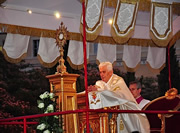ANGELUS
H.H. Benedict XVI
"On the Eucharist as Antidote to Individualism"
Without the Eucharist, the Church Simply Would Not Exist
June 26, 2011
www.zenit.org
Dear brothers and sisters!Today in Italy and other countries Corpus Domini is celebrated, the feast of the Eucharist, the Sacrament of the Body and Blood of the Lord, which he instituted with the Last Supper and which is the Church's most precious treasure. The Eucharist is like the beating heart that gives life to the whole mystical body of the Church: a social organism entirely founded on the spiritual but concrete link with Christ. As the Apostle Paul states: "Because there is one bread, we, although many, are one body: all of us in fact participate in the one bread" (1 Corinthians 10:17).
Without the Eucharist the Church simply would not exist. It is the Eucharist in fact that makes a human community a mystery of communion, able to bring God to the world and the world to God. The Holy Spirit, which transforms the bread and wine into the Body and Blood of Christ, also transforms into members of the Body of Christ those who receive it with faith, so that the Church is truly the sacrament of the unity of men with God and of men with each other.
In a culture that is ever more individualistic -- like that in which Western societies are immersed and which is spreading throughout the world -- the Eucharist constitutes a kind of "antidote," which operates in the minds and hearts of believers and continually sows in them the logic of communion, of service, of sharing, in a word, the logic of the Gospel. The first Christians, in Jerusalem, were an evident sign of this new way of life because they lived in fraternity and held all of their goods in common so that no one should be indigent (cf. Acts 2:42-47). Where did all of this come from? From the Eucharist, that is, the risen Christ, really present with his disciples and working with the power of the Holy Spirit. And in the succeeding generations, through the centuries, the Church, despite human limits and errors, continued to be a force for communion in the world. We think especially of the most difficult periods, the periods of trial: What did it mean, for example, for countries that were under the heal of totalitarian regimes to have the possibility to gather for Sunday Mass! As the ancient martyrs of Abitene proclaimed: "Sine Dominico non possumus" – without the "Dominicum," that is, the Sunday Eucharist, we cannot live. But the void produced by false freedom can be dangerous, and so communion with the Body of Christ is a medicine of the intellect and will to rediscover taste for the truth and the common good.
Dear friends, let us call upon the Virgin Mary, whom my predecessor, Blessed John Paul II defined as a "Eucharistic woman" ("Ecclesia de Eucharistia," 53-58). In her school our life too becomes fully "Eucharistic," open to God and to others, able to transform evil into good by the power of love, which fosters unity, communion, fraternity.
[After the Angelus the Holy Father addressed the pilgrims in various languages. In Italian he said:]
Dear brothers and sisters, today too I have the joy to announce the proclamation of some newly beatified persons. Yesterday, in Lübeck, Germany, Johannes Prassek, Eduard Müller and Hermann Lange, who were killed by the Nazis in Hamburg in 1943, were beatified. Today there will be three beatifications in Milan: Don Serafino Morazzone, an exemplary parish priest in Lecchese, who lived in the 18th and 19th centuries; Father Clement Vismara, heroic PIME missionary in Burma; and Enrichetta Alfieri, a Sister of Charity, called the "angel" of the Milanese prison of San Vittore. We praise the Lord for these luminous witnesses to the Gospel!
In Italy on this Sunday that precedes the Solemnity of Sts. Peter and Paul we celebrate the Day for the Pope's Charity. I would like to thank warmly all those who, with prayer and donations, offer their support to my apostolic and charitable ministry. Thank you! May the Lord give you recompense!
[In English he said:]
I am happy to welcome all the English-speaking pilgrims and visitors, particularly the group from Saint Fidelis Parish in Toronto. In many places today the Church celebrates the Solemnity of the Body and Blood of Christ. May our hearts rejoice in the great gift of Jesus, the Bread of Life, who has given himself for us and has come to nourish us. As we open our hearts to others and walk the path of life, may he always sustain and guide us. God bless you all!
[Concluding in Italian, he said:]
I wish you all a good Sunday, a good week. Happy Feast of Sts. Peter and Paul. I wish you all a good Sunday!
[Translation by Joseph G. Trabbic]
| H.H. Benedict XVI - -Regina Coeli |

